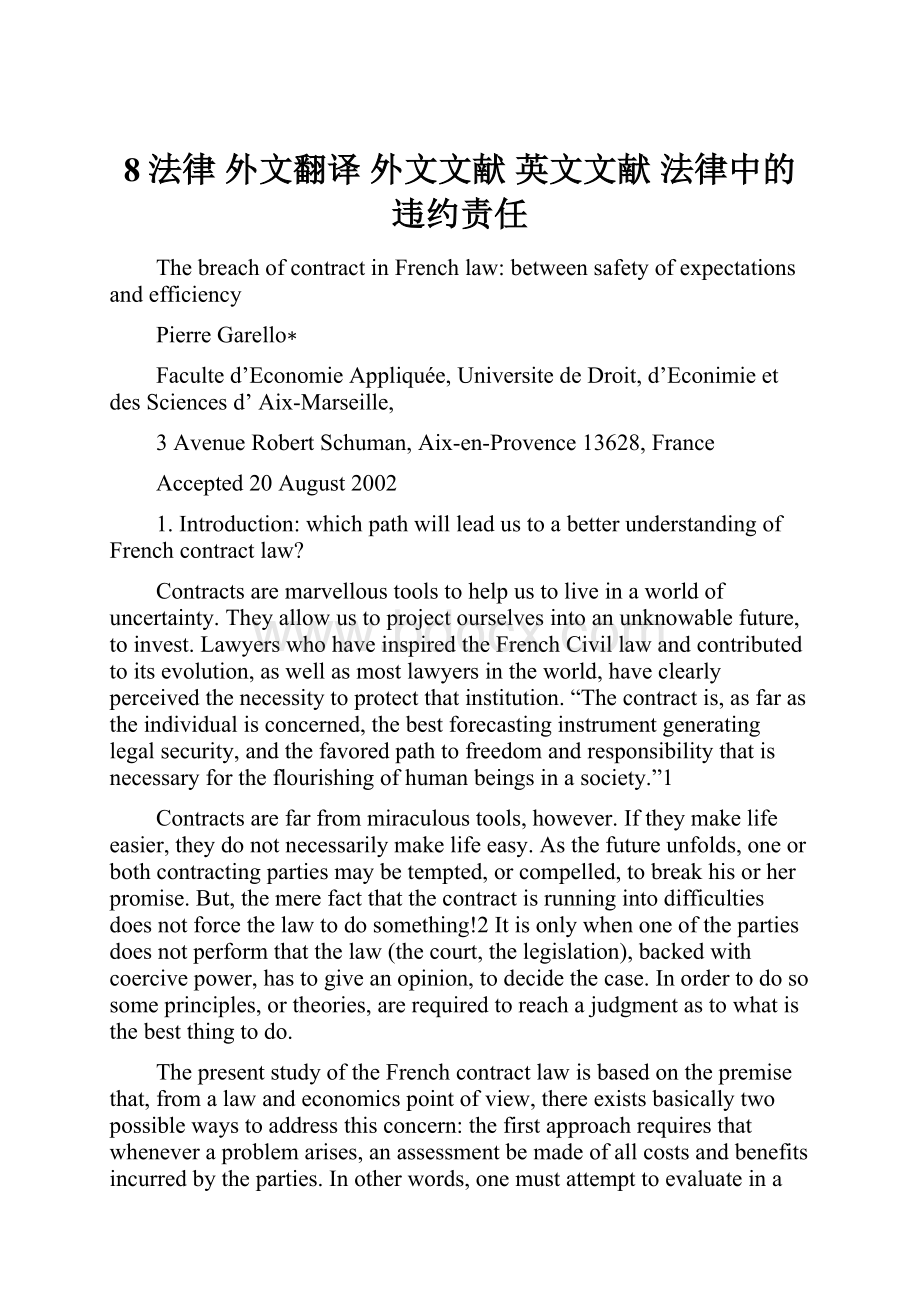8法律 外文翻译 外文文献 英文文献 法律中的违约责任.docx
《8法律 外文翻译 外文文献 英文文献 法律中的违约责任.docx》由会员分享,可在线阅读,更多相关《8法律 外文翻译 外文文献 英文文献 法律中的违约责任.docx(16页珍藏版)》请在冰豆网上搜索。

8法律外文翻译外文文献英文文献法律中的违约责任
ThebreachofcontractinFrenchlaw:
betweensafetyofexpectationsandefficiency
PierreGarello∗
Faculted’EconomieAppliquée,UniversitedeDroit,d’EconimieetdesSciencesd’Aix-Marseille,
3AvenueRobertSchuman,Aix-en-Provence13628,France
Accepted20August2002
1.Introduction:
whichpathwillleadustoabetterunderstandingofFrenchcontractlaw?
Contractsaremarvelloustoolstohelpustoliveinaworldofuncertainty.Theyallowustoprojectourselvesintoanunknowablefuture,toinvest.LawyerswhohaveinspiredtheFrenchCivillawandcontributedtoitsevolution,aswellasmostlawyersintheworld,haveclearlyperceivedthenecessitytoprotectthatinstitution.“Thecontractis,asfarastheindividualisconcerned,thebestforecastinginstrumentgeneratinglegalsecurity,andthefavoredpathtofreedomandresponsibilitythatisnecessaryfortheflourishingofhumanbeingsinasociety.”1
Contractsarefarfrommiraculoustools,however.Iftheymakelifeeasier,theydonotnecessarilymakelifeeasy.Asthefutureunfolds,oneorbothcontractingpartiesmaybetempted,orcompelled,tobreakhisorherpromise.But,themerefactthatthecontractisrunningintodifficultiesdoesnotforcethelawtodosomething!
2Itisonlywhenoneofthepartiesdoesnotperformthatthelaw(thecourt,thelegislation),backedwithcoercivepower,hastogiveanopinion,todecidethecase.Inordertodososomeprinciples,ortheories,arerequiredtoreachajudgmentastowhatisthebestthingtodo.
ThepresentstudyoftheFrenchcontractlawisbasedonthepremisethat,fromalawandeconomicspointofview,thereexistsbasicallytwopossiblewaystoaddressthisconcern:
thefirstapproachrequiresthatwheneveraproblemarises,anassessmentbemadeofallcostsandbenefitsincurredbytheparties.Inotherwords,onemustattempttoevaluateinasufficientlyprecisewaytheconsequencesofthecourtdecision—oroftheruleoflawunderconsideration—forbothpartiesaswellasforthirdparties(includingpotentialfuturecontractors).Thelawthen—andmorepreciselyhere,contractlaw—shouldaimprimarilyatprovidingtherightincentivestocontractingparties,whereby“rightincentives”onemeansincentivestobehaveinsuchawaythatthedifferencebetweensocialbenefitsandsocialcostsbemaximized.ItwillbearguedbelowthatFrenchcontractlawsometimesfollowsthisapproach.
Thesecondpossibleattitudelooks,apparently,prettymuchlikethefirst.Theguidingprincipleisagainthatthelawshouldprovidetomembersofthesocietytherightincentives.Butonemustimmediatelyaddthatthejudge—orthelegislator,ortheexpert—isnotinapositiontoevaluateandcomparethesocialcostsandbenefitsofalternativerulesoflaw.Heorshejustdoesnotknowenough.Onedoesnotknow,forinstance,alltheeffectsofarulethatwouldallowonepartytobreachacontract,withouttheconsentoftheotherparty.Indeed,evenifthevictimofthebreachispromisedafaircompensation,allowingsucharulegloballymighthaveanegativeeffectontheverypurposeoftheinstitution,whichistoreduceuncertainty.Asaconsequence,thelawshouldadoptagoallessambitiousthanthemaximizationofsocialwellbeing.Thatgoalcouldbe“toprotectcontracts,”or,inotherterms,tocreateasetofincentivesthatleadindividualstofeelconfidentthattheirlegitimateexpectationswillbefulfilled.
Aspointedout,thosetwoattitudesmayappearthesame,differingjustindegree.Thefirstoneassumesmoreknowledgeonthepartoflawyersandlegislatorsthanthesecond.However,whenitcomestopracticaldecision-making,differencesturnouttobeimportant,becausethemoreknowledgeableyouthinkyouare,thestrongerwillbetheincentivetoregulatethecontract,andthelowerwillbetherespectfortraditionandcustomsonwhichdailyexpectationsarebased.
Thetwoapproachesoutlinedabovearewellknowntoeconomists.Thefirstoneistheso-called“mainstream”(Paretian)approachandunderlinesmostoftheexistingeconomicanalysisoflaw.3Thesecondone,stressingtheproblemofknowledge,isfarlessdeveloped.4Wewillcallitthe“safety-of-expectationsapproach,”ortheAustrianapproachtolawandeconomics,becauseitcanbefoundprimarilyintheworkoftheAustrianschoolofeconomicthought,andespeciallyinHayek’sstudies.
“Therationale,”saysHayek,“ofsecuringtoeachindividualaknownrangewithinwhichhecandecideonhisactionsistoenablehimtomakethefullestuseofhisknowledge,especiallyofhisconcreteandoftenuniqueknowledgeoftheparticularcircumstancesoftimeandplace.Thelawtellshimwhatfactshemaycountonandtherebyextendstherangewithinwhichhecanpredicttheconsequencesofhisactions.Atthesametimeittellshimwhatpossibleconsequencesofhisactionshemusttakeintoaccountorwhathewillbeheldresponsiblefor.”5
Thereasonwhythesetwoapproachesarementionedattheoutsetisthat,whenonestudiesFrenchcontractlaw,itisdifficulttoreconcileallofitwithasingleapproach.True,themainstream,neoclassicalapproach,basedontheassumptionthatrulesbechosenthatmaximizesocialwealth(or,atothertimes,thatleadtoaPareto-efficientoutcome),canhelpustounderstandanimportantpartofthatbodyoflaw.But,aswillbeshown,certainFrenchdoctrinescannotbereconciledwithneitheraParetianapproach,norawealthmaximizingapproach.Insomeinstances,thelawseemstobemoreconcernedwiththesafetyofexpectations.
InthenexttwosectionswewillexaminethemaindoctrinesandrulesofFrenchcontractlawtryingtoidentifythosethatarecompatiblewithbothprinciplesandthosethatarecompatiblewithonlyone.Ifnoneofthosesetsareempty,itwillmeanthattheFrenchlawofcontractisnottotallycoherent;itcannotbebroughtunderauniqueunifyingprincipleofexplanation.ThenextnaturalquestionwouldthenbewhetherFrenchlawismovingtowardsoneprincipleandawayfromtheother.However,thispaperwillnotaddressthisquestion.
Thepaperisorganizedintwoparts.Indeed,forreasonsbrieflymentionedabove,itisimportanttounderlineinafirstpartthemanythingsthelawdoesinordertoavoidbreachofcontract:
whatcanbedoneinordertosaveacontractwhenthepartiesarehavingdifficultiesperforming,andwhatisforbidden?
Thesecondpartdealsdirectlywiththebreachofcontract.ItwillbeshownthatFrenchlawdiffersinsomeimportantrespectsfromothercontractlaws.
2.Savingthecontract6
Wewillstudythevariousattemptsto“save”thecontractbylookingfirstattheconditionsforinvalidity(Section2.1),thenatthevariouspossibilitieslefttothejudgetointerpretthetermsofthecontract(Section2.2)andendwiththestudyofthecaseswherethejudgeisauthorizedtochangethetermsofthecontract(Section2.3).
2.1.Invalidcontracts
Onewaytosavethecontractistoprovethattherewasnovalidcontractinthefirstplace!
FormationdefensesasdefinedintheFrenchlawareroughlyidenticaltothosefoundinthecontractlawsofothercountries.Themaindefensesare:
incompetency(incapacité),mistakes(erreur),fraud(dol),duress(violence),absenceofcause(remindingusofthedoctrineofconsiderationinthebargainingtheory),failuretodiscloseinformation,lésion(adefenseclosetounconscionability),7or,maybemorespecifictoFrenchlaw,aconflictbetweentheprivateagreementandordrepublic,i.e.publicpolicy,or“lawandorder”(seeart.6and1134oftheFrenchCivilCode,henceforthC.civ.).Inalltheseinstances,anactionmaybetakenforannulmentofthecontract,thejudgebeingtheonlyoneentitledtoinvalidateacontract.
But,whatexactlyismeantbyinvalidityintheFrenchlaw?
Whataretheconsequences?
TheFrenchlawdistinguishesbetweenabsoluteinvalidity(nullitéabsolue)andrelativeinvalidity(nullitérelative).Thefirstcategoryincludesallthecontractsthatareagainstwhatiscalledordrepublicdedirection,thatistosay,contractsthatviolateapublicpolicyjudgedtobebeneficialtothesocietyasawholeandnotonlytothoseindividualsinvolvedinthatparticularcontract.Forsuchcontractsnothingcanbedoneandcompletenullitycannotbeavoided.Thesecondcategoryismadeofcontractsthatviolatetheordrepublicdeprotection,thatis,contractsinwhichonepartydoesnotrespectapublicpolicydesignedtoprotectweakerparties.Inthosecircumstances,thevictimwhothelawistryingtoprotectmaychoosetoletthecontractstandaftermodificationstothecontract.8
Inbothcases,however,theresultisasifthecontracthadneverexisted,andretroactivitywithrestitutionisthegeneralprinciple:
oneissupposedtogobacktothesituationthatprevailedbeforethecontractwascreated:
thestatusquoante.Partiesarerelievedoftheirobligations,anddamagescannolongerbeawarded,butitisstillpossibletobringatortlawaction.9
Fromaneconomicpointofview,mostoftheformationdefensesmentionedhavealreadybeenanalyzedinvariousplaces,thebottomlinebeing:
anycontractthatisnotvoluntarymustbeconsideredasinvalid.Onecanseehoweverthat,fromastrictlyParetianpointofview,itisnotclearthatallinvoluntarycontracts—e.g.contractsrelyingonamistake—willalwaysbedominatedbythesituationprevailingbeforethecontract.IfonechoosestheHayekian,safety-of-expectationspointofview,suchadilemmaislesslikelytooccurtotheextentthatpeopleexpecttransactionstobevoluntary.Consequently,anyinvoluntarytransactionviolatessome“legitimateexpectations.”
Beforeleavingthetopicofnullity,tw